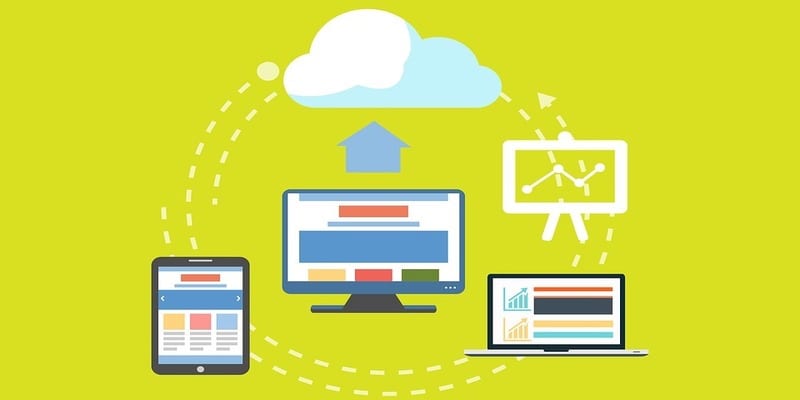Taking a Closer Look at ERP in the Cloud


If you searched the Internet right now for “what is cloud computing,” the results would probably show technical jargon like hybrid, SaaS, PaaS, laaS, etc. These are all ways to describe certain cloud computing traits – but in reality, they only add to the confusion of what cloud computing really is. Luckily, most cloud-based Enterprise Resource Planning (ERP) platforms are designed so business leaders don’t need to understand the technical jargon to understand the business value.
In a recent study, nearly 81 percent of the business polled claimed they had either implemented the use of ERP software in the last year, or were in the process of implementation. Now, in today’s digital environment where business teams and employees can collaborate on important documents, spreadsheets, and enter important data from remote locations – ERP software is most efficient when it’s utilized via the cloud.
With an easy to use and effective cloud-based ERP system, you can make great strides when it comes to managing and utilizing the resources you have. We spoke to Rich Murr, CIO of Epicor Software, about cloud-based ERP software to help simplify it all for you. He’s provided us with some of the top questions (and answers) business leaders should consider while thinking about implementing cloud ERP software.
Widget not in any sidebars
Will the solution give us the features and functionality we need now and in the future?
Businesses build, sell, and support products and services that meet their customers’ needs. IT solutions that enable these tasks have existed for many years, but cloud versions increasingly offer faster implementations, a richer set of capabilities, and more rapid access to innovations. Additionally, given the real-time, always-on nature of the cloud, cloud-based ERP solutions can evolve more quickly than on-premise systems to provide the latest capabilities. Business leaders can expect this evolution moving forward to include industry specialization, and new and improved means to glean business intelligence from data.
Does it make sense for us financially?
For companies without an ERP solution in place, starting with a cloud-based ERP solution is a great choice. When you already have a legacy solution, the answer is more complicated, and should take into account existing investments in software (e.g., development and/or licensing), the cost of operating the software (e.g., data centers, hardware, networks, talent), and the value derived from gaining access to new features and functionality. If you review the investment over a longer time period, the more likely it is that the cloud solution will offer a significantly lower total cost of ownership.
Will ERP data and other information be secure?
Security is often the biggest concern for many considering a move to the cloud – in the research cited previously, it was the leading perceived barrier to cloud adoption. You need to consider security of your company’s information as well as your customers’ information. The good news is that cybersecurity solutions are continually improving, and cloud providers increasingly have the edge over internal IT teams when it comes to detecting and preventing cyber attacks, especially when compared to SMBs with little or no IT staff.
Will the cloud ERP solution be available when we need it?
When you’re relying on a cloud ERP vendor to operate the software used to run your business and serve your customers, you need assurances that it will always be available. Look for Service Level Agreements that guarantee performance. 99.5% system availability per month is the lowest uptime percentage you should accept, and make sure the financial penalties for under-performance are a sufficient incentive for the vendor to deliver.
“How cloud ERP vendors answer these questions will tell you a lot about their ability to meet your business needs. They’ve all heard these questions before, and you should expect credible answers delivered in easily understood business terms. For larger companies that need to dig deeper into the technical details, such as how a vendor’s solution integrates with existing applications, good cloud computing vendors will have technical staff to answer these questions, too,” Murr explains.
Nucleus Research has found cloud deployments deliver 3.2 times the return on investment of on premises deployments, cloud ERP can deliver even more, such as the ability to drive exceptional value and fuel growth for your business.
About the Author
 Rich Murr is a technology executive with over 20 years of leadership and enterprise IT experience, to include application development and operational roles with startups, consulting companies, retailers and technology service providers. In his current role he is the chief information officer at Epicor Software.
Rich Murr is a technology executive with over 20 years of leadership and enterprise IT experience, to include application development and operational roles with startups, consulting companies, retailers and technology service providers. In his current role he is the chief information officer at Epicor Software.
Looking for more? Download our Enterprise Resource Planning Buyers Guide for free to compare the top-24 products available on the market with full page vendor profiles, key capabilities, an ERP software market overview, our bottom-line analysis, and questions for prospective buyers.
And don’t forget to follow us on Twitter, Facebook and LinkedIn for all the latest in the ERP space!























